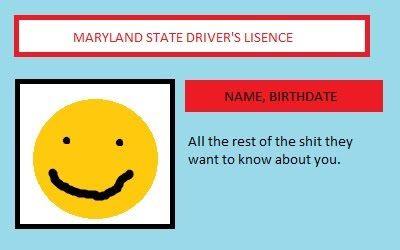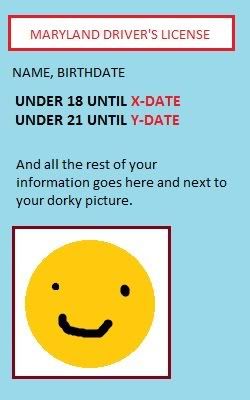Everything--or nearly everything, anyway--has a grey area. Even something as seemingly straightforward as killing someone has grey areas, lest we forget about freak accidents or acts of self-defense. While some things I'll admit are pretty well objectively wrong no matter the circumstances--like discrimination against certain demographics based on factors beyond their control such as race or sex or orientation, or sexual assault of any kind, I really can't imagine any circumstance under which either of those would venture into a moral grey area--most rules and laws aren't going to apply exactly the same way to every situation every time. And treating all the differing circumstances exactly the same way and treating them to a one-size-fits-all solution is at best misguided and at worst could result in grievous miscarriages of justice. Which is why we dedicate an entire section of our government to the endless interpretation of every nuance of law. Not that they're doing a flawless job of it, just that the job has to be done.
A particular turn of phrase exists to describe this: the letter versus the spirit. It's entirely possible to bend the rules or slightly break laws as they are explicitly and literally written while remaining faithful to whatever intentions inspired their creation in the first place.
Whenever a police officer lets a driver go without a ticket for exceeding the speed limit by some small amount--five miles, let's say--he or she is following the spirit of the law while breaking the letter. Exceeding the speed limit by one mile is, strictly speaking, 'speeding' and you can absolutely get a ticket for doing it since it's against the law as the law is explicitly written. The reason this doesn't happen is because doing so doesn't violate the spirit in which the law was intended--speed limits aren't there to specifically dictate how fast drivers are to go, but rather to keep the roads as safe as possible. And excessive speed is dangerous--a car going too fast will have a harder time stopping, be more difficult to control, and in the event of a collision the force of impact will be exponentially intensified--but a difference of five miles isn't dangerous by itself if the driver is otherwise behaving in a safe and responsible manner and the conditions aren't hazardous. In this case, while the letter of the law has been broken, the spirit of it was not violated since the speed itself presented no danger.
Does that make sense?
At the same time, it's possible to do the exact opposite and strictly adhere to the literal interpretation of a law precisely as it's worded while at the same time completely and totally missing the big picture. Missing the forest for the trees, as it were. It's actually kinda hard to come up with a fictional scenario for this example that isn't wildly controversial in some way, so I'm just going to go ahead and tell my favourite 'Are You Fucking Serious?' story that happens to also be a perfect example of following the letter of the law exactly without grasping the spirit in which it was intended.
To start, you need some background information. In Maryland, where I moved from last year, driver's licenses were issued obviously and visibly different to drivers under 21 than to everybody else. If you are over 21 when the license is issued (or the first time you renew it after your 21st birthday), then your license is oriented horizontally, like this:
For everybody who is issued a license or renewal before the age of 21, it's oriented vertically, like this:
It's actually kind of a good idea, at least in theory--it's just one minor difference but it visibly separates potentially underage kids from everyone who can totally get shitfaced. (Unless they have a fake ID, of course, but that's neither here nor there.) Even handier for bouncers who can't do math, helpfully written in large bold red type on every under-21 license is the exact dates after which it is legal to sell them porn and cigarettes, and the date after which it is legal to sell them beer. You don't have to do any math at all--you just have to know what the date is. It couldn't be any simpler.
But at some point before my 21st birthday several years ago, the state of Maryland enacted a law that required anybody purchasing alcohol to have the horizontally-oriented 'normal' license rather than the vertical one--and possession of the vertical license barred you from being served alcohol even if you were over 21. I understand why this might have seemed like a good idea--I mean, maybe the people serving booze now are illiterate or legally blind or in some other way incapable of matching today's date with the 'UNDER 21 UNTIL' date and leaving them with no other option than to go by the way the license is printed.
Of course, I had no idea that this law existed--and neither did anybody else I asked about it--and since my birthday is in August and my license didn't need to be renewed until October, I didn't see any reason to subject myself to the MVA prematurely. So imagine my surprise when I went out to dinner to celebrate belatedly a week after my actual birthday and was told by the waitress that I couldn't legally drink until I got a new license. Even though I was 21 years and one week old. I was old enough to buy alcohol and I had the legitimate identification to prove it--serving me alcohol would not have been in any way against the law, except for the arbitrary fact that my license faced the wrong way.
This one is a pretty obvious case of following the law to the letter and missing the point entirely. The point is obviously to make it harder for anybody underage to obtain alcohol, but I wasn't underage and I wasn't doing (or trying to do) anything illegal. I just wanted a drink. In the end someone with the appropriate-looking license bought the drink and gave it to me, which in retrospect would probably have gotten us into some trouble but we were all so stunned by the 'WTF??'-factor of the whole business that we figured there was no way anybody would be able to charge us with any crimes because we weren't committing any. (Again, in hindsight I was on thin ice--drinking age is technically left up to each state to decide and I don't know how much or what kind of trouble I could have gotten into for obeying the state drinking law while breaking another state law that happened to contradict it. It's like the state legislature was dividing by zero or something.)
The point I'm trying to make here is that the real world is way more complicated than a straight 'yes-or-no' mentality allows for. A strict adherence to a law as written can technically criminalize something that isn't otherwise forbidden, and not every circumstance under which a law is broken also violates the laws of common sense that make up the big picture. A literal interpretation and immovable adherence to anything--law, religious text, advice, or whatever else you can think of--is a very unrealistic, immature, and problematic way of thinking and it has no place in a civilized world.
You shouldn't hit other people, but sometimes you have to defend yourself. You have to stop at red lights, but sometimes you're driving a woman in labour to a hospital. Breaking into someone else's home is never okay, except that your 84-year-old neighbour hasn't been seen since Monday and phone calls are going unanswered.
To be fair and civilized people, we have to accept that very few things are invariably right or invariably wrong. Black-and-white thinking might feel simpler and present the promise of invariable consistency that most people long for, but the reality is that 'right' and 'wrong' are luxuries we just can't afford anymore.


No comments:
Post a Comment